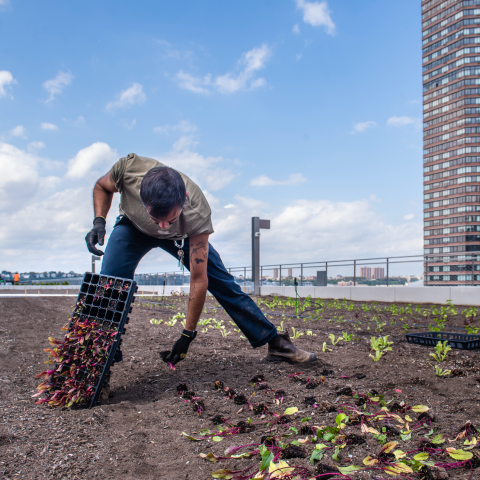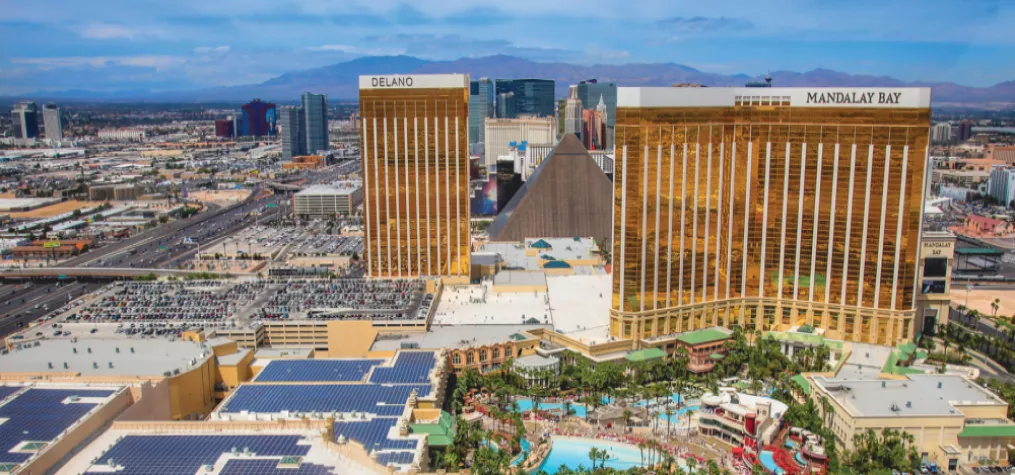Javits Center Excels as a Model of Sustainability with Pioneering Rooftop Farm and Other Upgrades

New York City’s Javits Center may be located in one of the busiest cities in the world, but it’s as green as it gets at this newly expanded facility. The center just unveiled an innovative 200,000-square-foot rooftop that features a glass-enclosed pavilion, an outdoor terrace and a one-acre working farm that is expected to generate up to 40,000 pounds of produce each year for the center’s banquet operations. The farm, along with other enhancements, builds upon the center’s other sustainability success stories, including an existing 6.75-acre green roof that serves as a habitat for area wildlife.
“This new rooftop is one of the most exciting event spaces in New York City in more than a generation,” said Alan Steel, President and CEO of the New York Convention Center Operating Corporation, which operates the Javits Center. “With stunning skyline views and state-of-the-art technology, the rooftop creates a unique roof-to-table experience for our guests while enabling our staff to push the boundaries of sustainability and further explore how to improve the quality of life for our neighbors—those with wings and those without.”
The rooftop is one of the last elements of the sustainability-focused, $1.5 billion expansion, which added 1.2 million square feet of dynamic event space. Along with the rooftop, expansion features include 90,000 sq. ft. of new exhibit space, which brings the center’s total to 500,000 sq. ft. of contiguous exhibit space on one level; 107,000 sq. ft. of meeting space; 113,000 sq. ft. of pre-function space and a 480,000-sq.-ft. truck marshaling facility that has significantly minimized the center’s impact on the community by bringing trucks off the roads.
As a part of the project, 75% or more of all construction waste was diverted from landfills for reuse, and all construction materials were chosen with sustainable characteristics, including high recycled content and local sourcing (within 500 miles).
The rooftop and the entire expansion project have achieved LEED Gold Certification from U.S. Green Building Council.
“We are excited for the public to enjoy this pioneering design that exemplifies how the built environment can support the natural environment while prioritizing the health, safety and well-being of building occupants,” said Bill Barton, construction executive at Turner Construction Company, one of the partners that spearheaded the expansion. “This intentional approach to sustainability in the design and build across the entire expansion has made the Javits Center one of the most cutting-edge facilities in the world.”
Highlights of the new rooftop include:
- The Farm. The one-acre rooftop farm utilizes recycled rainwater for irrigation and provides fresh produce for Javits Center’s banquet operations. There is also a greenhouse that can host intimate gatherings such as board meetings or meals for up to 25 people. Brooklyn Grange, a Brooklyn-based urban farming company, manages the day-to-day operations of the farm and the greenhouse, and works closely with members of Javits Center’s hospitality team, Cultivated, to direct crops to its on-site kitchens, where the produce is incorporated into meals served to clients.
- The Pavilion. The 15,000-sq.-ft., glass-enclosed Pavilion can host events for up to 1,500 guests throughout the year. It sits adjacent to a massive outdoor terrace, along with a meadow, a shade garden and an orchard with 32 apple trees and six pear trees that also provide produce for client meals.
- Solar Farm. More than 3,000 solar panels will eventually to be installed on the new rooftop as well as the existing one across from it, which will give the center the largest rooftop solar farm in Manhattan. It is expected to generate 1.7 megawatts of solar energy with an additional 3.5 megawatts of battery storage, providing the convention center with more than 2 gigawatt hours per year.
- Water Conservation. The installation of two underground retention cisterns helps capture and treat rainwater to be used for irrigation on the roof, reducing the need for potable water for irrigation by at least 50%.
From the new rooftop, guests are able to see the green roof on the center’s original building, which was built as part of another expansion from 2009-2014 and is home to 35 bird species, five bat species and five bee hives that the center has put to creative use, according to Steel.
“We collect honey from them and give it to our customers, and we also make lip balm from the wax that we give away, and we find that it’s good for our customers and our employees,” he said. “Customers like to be in a place where there is a sense of sustainability, and it's really good for employees to feel as if they’re working in a place that make the planet a better place.”


Add new comment